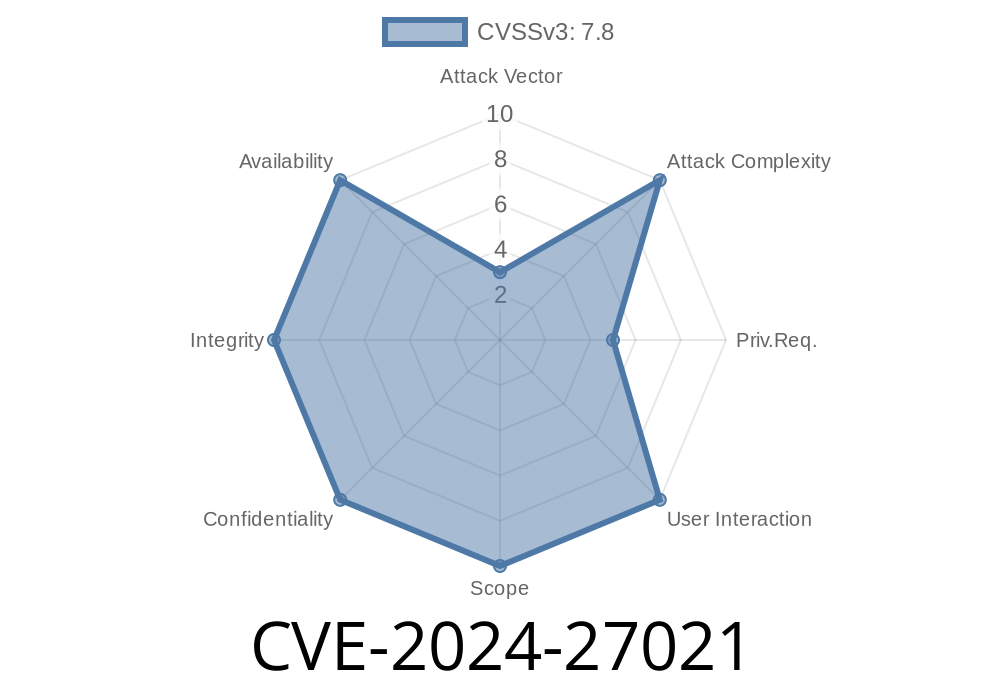CVE-2024-27021 is a recently patched vulnerability in the Linux kernel's r8169 driver, which is responsible for supporting Realtek 8169/8168/8101E PCI network cards. This bug caused a deadlock situation due to mishandling LED registration while unloading the kernel module, which could potentially freeze the network stack or cause system instability.
The bug specifically relates to the driver’s use of the devm_led_classdev_register() function and improper resource lifecycle management, triggering a deadlock scenario linked to the networking subsystem’s lock (RTNL).
Let’s break down what went wrong, how it was fixed, and see code explored in plain terms.
Vulnerability Summary:
When removing the r8169 kernel module, the device-managed LED function could cause a deadlock involving the RTNL lock (network stack global lock), freezing further module operations and potentially blocking network configuration or shutdown.
Severity:
Medium – causes deadlocks and affects system reliability, but doesn’t directly allow for privilege escalation or code execution.
Technical Details
The root problem was using devm_led_classdev_register() to manage network-device LEDs. The function’s device-resources binding means when the network device is deleted (e.g., module removed), it uses an automatic release mechanism—sometimes while holding the RTNL lock. If other code inside the LED subsystem or driver tries to acquire this lock, it deadlocks.
Unwinding the LED class device may also need RTNL, leading to deadlock.
*In simple terms, the cleanup operations lock up the network stack while waiting for themselves to finish — an impossible wait!*
Original Vulnerable Code (Simplified)
// Bad: Automatic device-managed cleanup can conflict with networking locks
err = devm_led_classdev_register(&pdev->dev, &tp->led);
if (err)
return err;
// ...
// On module removal (in r8169_remove): automatic release tries to
// cleanup while RTNL is held
## Patch / Fix – The Solution
The patch removes the device-managed LED registration and manually handles registration and unregistration in the driver. This frees the LED resource outside of the tricky locking path, avoiding deadlocks.
Relevant patch: linux.git commit fe4a09f14e8c ("r8169: fix LED-related deadlock on module removal")
Fixed Code Example
// Good: Manual registration and unregistration
err = led_classdev_register(&pdev->dev, &tp->led);
if (err)
return err;
// ... later, on module removal:
led_classdev_unregister(&tp->led);
// Note: It's safe to call led_classdev_unregister() even if registration failed.
// It’s a no-op if not registered (as per LED subsystem design).
Why is this safe?
Because the LED subsystem checks if a device was never registered and just ignores the request to unregister in that case. There’s no double-free or crash.
Proof-of-Concept Exploit
There is no remote or privilege escalation exploit. But here’s how you could *demonstrate* the deadlock on affected kernels:
`
If you see the shell locking up, or the network stack hangs (e.g., ip link stops responding), you hit the bug.
References
- Kernel Patch Commit: Fix LED-related deadlock on module removal
- CVE-2024-27021 at NVD *(listing may be pending full update)*
- LED Subsystem Documentation
- Linux Networking Locks (RTNL)
Should You Worry?
If you run Linux on desktop or server hardware with Realtek network adapters, and are likely to remove or reload network drivers (module reloads, updates, hot swaps), install the patched kernel to avoid hangs.
Standard users rarely unload such drivers, but it's critical for kernel developers, packagers, and automated deployment systems!
Summary
- CVE-2024-27021 caused by bad interaction between device-managed LEDs and the network locking subsystem in r8169 driver.
Rolling out the fix prevents rare but nasty deadlocks upon module removal.
Keep your kernels up to date, especially if you manage hardware, networking, or kernel drivers!
Did you find this breakdown helpful? If you want more deep Linux CVE explorations in simple language, let us know!
Timeline
Published on: 05/01/2024 06:15:20 UTC
Last modified on: 08/02/2024 00:21:05 UTC
